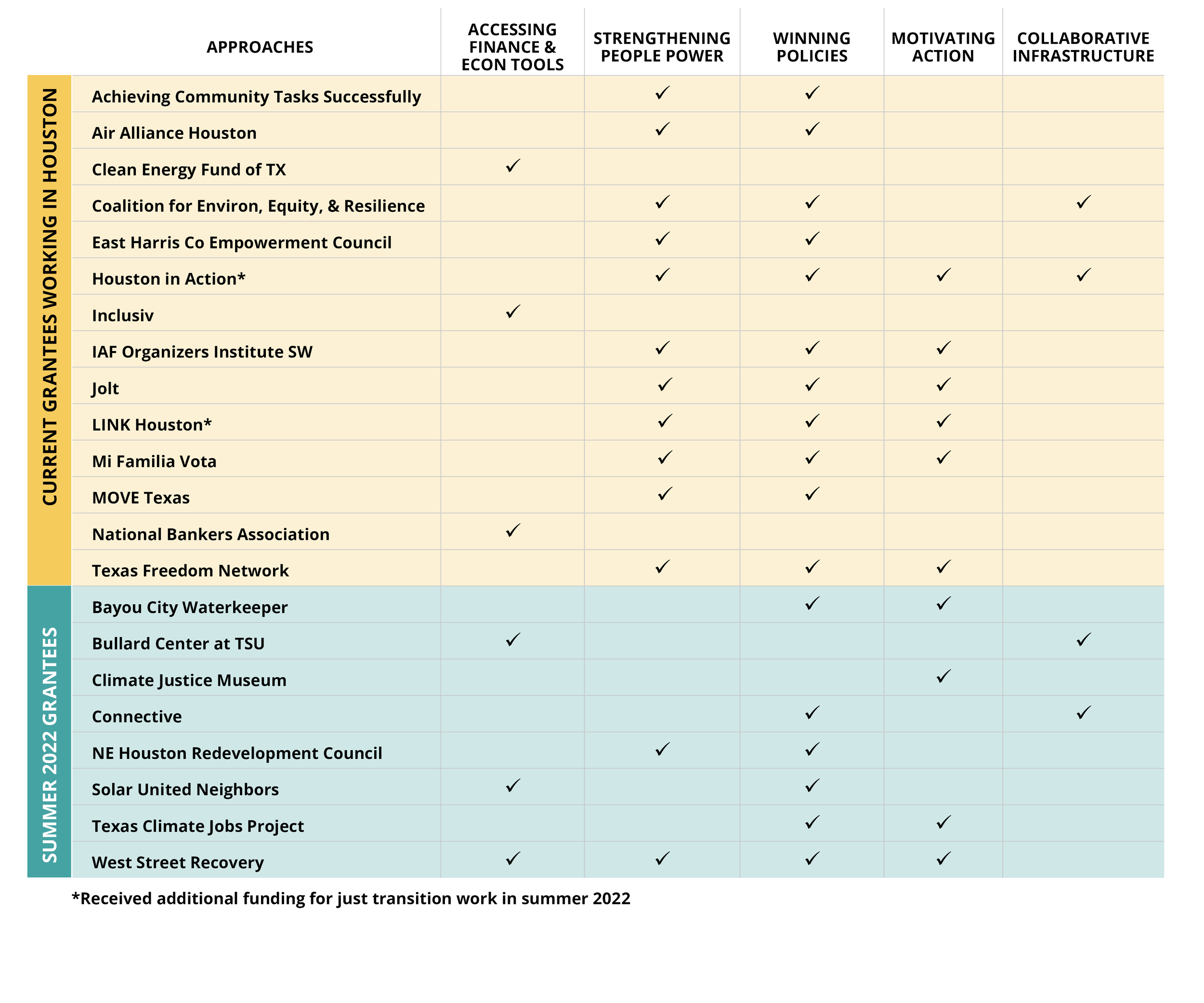Supporting a Just Transition in Houston
The Greater Houston area is home to more than seven million residents and is among the most diverse in the nation. It is the fifth largest metro economy in the US, and yet, because of pervasive oil, gas, and petrochemical pollution, its toxic air emissions are larger than those of the top four metro economies combined.
Communities on the eastern side of the city have disproportionately borne the brunt of polluting industries, as well as redlining, disinvestment, floods, and storms. Leaders from these communities are putting forward a vision for transition that includes not only a switch from dirty energy to cleaner renewable energy, but also greater resilience, wealth, health, and mobility.
Hurricane Harvey and Winter Storm Uri have galvanized public support and political will throughout the metro region — opening space for action that has been stymied by dirty energy opposition for decades and spurring the city to make good on its goals of cutting climate pollution 75 percent by 2040 and becoming carbon-neutral by 2050. Seizing on this moment of public momentum, political will, and large-scale federal investment through the Inflation Reduction Act to achieve climate justice in Houston can send ripples throughout Texas, the US’s largest climate polluter, as well as the nation and the globe.
This summer, Hive Fund awarded multiyear grants to ten Houston-based organizations, with a focus on Northeast Houston. Increased support to this constellation of stellar organizations will bolster efforts to leverage public and private funding for community-based climate justice projects, win policy changes at local and state levels, and move hearts and imaginations away from fossil-dependent economic development, helping transition this icon of oil and injustice to an exemplar of an equitable and clean energy future.
Our grantmaking strategy in Houston is informed by a group of Houston-based community leaders, who provide insight on strategy, local context, opportunity, and potential grantee partners. Based on input from these advisors and more than 50 other local organizations over the last year, we are funding constellations of organizations working to achieve three community priorities:
Increased Resilience: Home weatherization, energy efficiency, and flood mitigation
The most common goal we heard from advisors in Houston is more resilient and energy efficient infrastructure and housing. Many low-income residents in NE Houston face significant energy burdens, spending more than seven percent of their income on home energy bills, compared to the median US spending of three percent, exacerbating widening wealth inequality. Improperly weatherized homes also contribute unnecessarily to climate change, with residential energy use accounting for roughly 20 percent of global warming emissions in the US.
NE Houston Redevelopment Council engages the community in climate justice and resiliency efforts, including transit improvements, clean energy, flood mitigation and more.
While wealthy areas of the city are building raised homes, improved storm drains, and new detention ponds with hiking trails and other amenities, many residents in less affluent areas including NE Houston are still living in damaged homes and suffering through floods from minor rainstorms because of continued city and county disinvestment, compounded by inequitable disaster recovery funding distribution.
Increased and Affordable Clean Energy Access
A second and related goal expressed by many advisors was increased access to clean, affordable, and resilient energy sources ranging from more solar, wind and storage to resilient microgrids. People want power infrastructure that won’t leave them in the dark for days after a disaster or be intentionally cut off because their communities are not prioritized. Several organizations talked about “lily pads,” places like schools or churches with clean, resilient energy supplies where residents can go in times of disasters. These could eventually form a carbon-free power infrastructure in NE Houston and beyond for charging cars, bikes, and buses and providing other electricity needs.
Clean and Equitable Mobility
The Hive Fund awarded increased funding to LINK Houston to support safe and equitable mobility projects in NE Houston. Photo by Jorge Sanhueza-Lyon.
Nearly half of the Houston metro region’s climate pollution comes from transportation. In 2021, the Metropolitan Transit Authority of Harris County (METRO) approved a goal to transition the entire METRO fleet to zero-emission vehicles by 2030 as part of their broader climate action plan. Seventy percent of the 4.6 million people living in the METRO service area are people of color. This service area also has disproportionately high rates of poverty and households that rely on public transit. Advocates are working to ensure that METRO’s climate goals are implemented in ways that benefit these communities and provide variety of transit improvements, including better sidewalks, bikeways, and crosswalks; more shade and lighting at bus stops; more frequent bus routes; and more. Access to finance for these projects is a key barrier.
Meeting these goals requires a comprehensive approach that cuts across issues areas and supports long-term power-building to create and sustain systemic change. Our advisors and partners encourage us to fund constellations of groups and collaborative infrastructure across groups using the following approaches:
Accessing finance and other economic tools to accelerate an equitable and just energy transition:
Increasing the flow of public and private capital to resilient infrastructure, clean energy, and equitable mobility projects. With billions of dollars coming available through the Inflation Recovery Act, this is a critical moment for finance capacity-building.
Advocating for and supporting access to jobs with good pay, equitable hiring practices, and healthy working conditions so that people can see a pathway to a good life in this growing new economy.
Strengthening and flexing people power through increased civic engagement: Increasing community-based organizing among NE Houston residents and aligning these efforts with broader civic engagement efforts in the region and across the state to strengthen political will and hold policymakers accountable.
Shaping, winning, and implementing strong and equitable clean energy policies: Policy and legal work to shape the laws, policies, and budget priorities to ensure that resources are more equitably distributed. Policies that reflect community priorities are policies co-created by community members themselves. Policy changes can also help turn small pilot projects into broader programs.
Motivating people to action through emotion, connection, values, and expanded imagination: Building and sustaining public momentum through a collective, culturally rooted vision about what a just transition looks like, why it is important, and how people’s lives can be better because of it.



